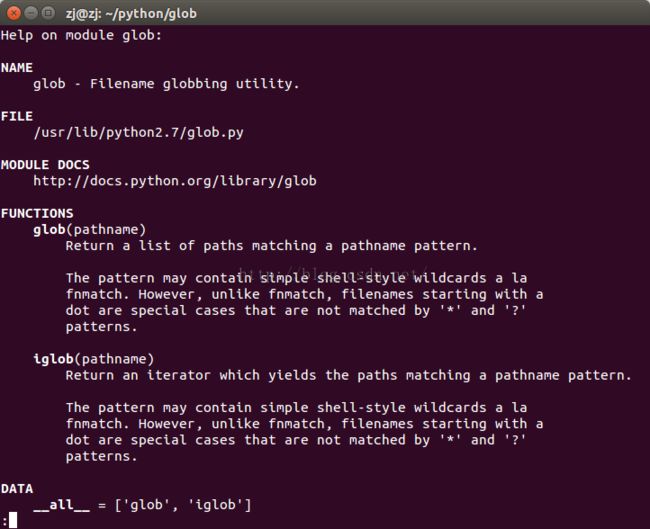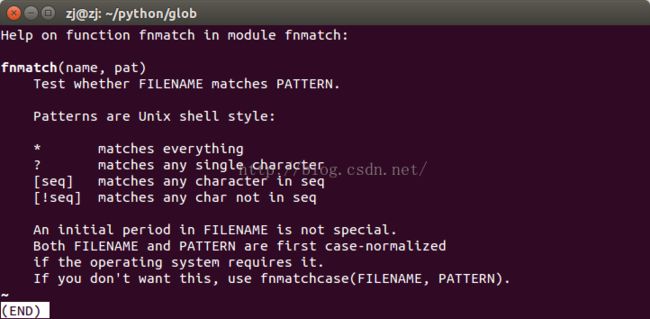python glob fnmatch 用于文件查找操作
参考:
http://python.jobbole.com/81552/:Python模块学习:glob文件路径查找
http://blog.csdn.net/suiyunonghen/article/details/4517103:python中的一个好用的文件名操作模块glob
https://docs.python.org/2/library/glob.html:10.7. glob - Unix style pathname pattern expansion
https://docs.python.org/2/library/fnmatch.html#module-fnmatch:10.8. fnmatch - Unix filename pattern matching
#################################################################3
测试集文件分布情况:
3##############################################################3
本人glob源码位置:/usr/lib/python2.7/glob.py
函数名:glob
参数名:pathname - 路径名(可以使用相对路径或绝对路径)
功能:返回一个列表,存储所有匹配你参数名的文件路径(当你使用相对路径时,文件路径为相对路径;当你使用绝对路径时,文件路径为绝对路径)
note:查找的范围仅在路径名所在目录
路径名必须使用通配符,不过只有三种(*/?/[])。*代表所有文件,?代表一个字符,[]表示想要匹配的多个字符(比如,[0-9]表示匹配数字0-9)
查找当前目录下所有文件和目录:
note:由上图可知,仅提供路径并不会得到任何结果
查找当前目录下的txt文件:
已知测试集共有三层
查找第二层的所有txt文件:
函数iglob(pathname)功能和glob类似,只不过iglob返回的是迭代器。查看源码可知,两个函数其实一模一样
def glob(pathname):
"""Return a list of paths matching a pathname pattern.
The pattern may contain simple shell-style wildcards a la
fnmatch. However, unlike fnmatch, filenames starting with a
dot are special cases that are not matched by '*' and '?'
patterns.
"""
return list(iglob(pathname))
###########################################################################33
共有四个函数:
函数filter:
返回列表names中符合模式pat的子集
函数fnmatch
测试name是否符合pat的模式
pat格式符合Unix文本类型:
*-表示所有
?-表示一个单一字符
[seq]-表示符合[]内的序列的字符
[!seq]-表示不符合[]内的序列的字符
查看源码知,该函数功能和fnmatcncase一样:
def fnmatch(name, pat):
"""Test whether FILENAME matches PATTERN.
Patterns are Unix shell style:
* matches everything
? matches any single character
[seq] matches any character in seq
[!seq] matches any char not in seq
An initial period in FILENAME is not special.
Both FILENAME and PATTERN are first case-normalized
if the operating system requires it.
If you don't want this, use fnmatchcase(FILENAME, PATTERN).
"""
import os
name = os.path.normcase(name)
pat = os.path.normcase(pat)
return fnmatchcase(name, pat)
函数fnmatchcase
没有规范化参数,仅仅判断文件名是否匹配模式符,包括大小写
note:参数均为单个字符串









